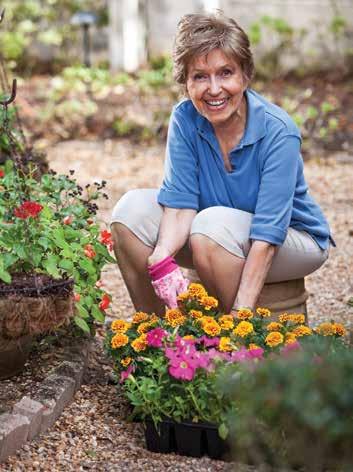
3 minute read
WhyWEIGHT?
Building muscle is critical to aging well
If 60 is the new 40, how do we ensure that we look and act like 40 despite the number of candles on our cake? The key is to avoid sarcopenia. That’s the scientific term for losing muscle mass and gaining fat as we age.
Advertisement
The repercussions of sarcopenia can be deadly because it increases our risk for falls and frailty. To keep sarcopenia at bay you’ve got to start weight training. In fact, twice a week strength/resistance training is recommended by the Centers for Disease Control in addition to 150 minutes of moderate to vigorous aerobic exercise.
If you’re looking for proof you can build muscle in your senior years, look no further than Tami Allen and Dottie Cummings. Allen is 80 years old and a powerlifter. This onetime horsewoman has had both knees and a hip replaced so her riding days are over. She tried CrossFit six years ago but realized it was a younger person’s sport, what with the tire-flipping and other activities that were too aggressive for her. As she says, she didn’t need to train for the Olympics but rather for her life. She wanted to be fit, maintain her strength, and improve her balance.
Allen joined Thrive Fitness & Wellness near her home in Columbia County and began working with fitness studio head trainer Derek Gelato. By November 2022 she was ready to compete in a powerlifting competition where this mother of four, grandmother of 14 and great-grandmother of five dead lifted 203.4 pounds, her personal best.
Today, Allen is in the gym three times a week and says she’s found camaraderie with other women who train there and inspiration from the younger folks who are working out. “You can’t wait and put off your life,” Allen says of her dedication, “because if you do, you’ll never do it.”
Dottie Cummings, 79, agrees. Like Tami she was always active. She ran through her 30s and then took up biking around age 50. While she still enjoys those activities and dancing, she says, a few years ago she realized her upper body strength was diminishing. Fear of becoming reliant on others to help her with daily activities sent her to the gym. Now she’s got no trouble opening jars, hauling a 40-pound bag of water softener pellets or bags of mulch for her garden, and when she travels no one has to lift her suitcase to and from the overhead bin.
And there’s been another payoff. Before Cummings started the weight training program, she had all three markers for osteoporosis. Thanks to bone-building medication and weightlifting, only one marker remains. She’s proof of what the National Institute of Arthritis touts that weightlifting makes our bones denser. Bone-tissue growth is stimulated because when we do strength training the body to overcome gravity, causing your muscles to pull on your bones.
Paul Arciero is a professor of health and human physiological sciences at Skidmore College and director of the Human Nutrition and Metabolism Lab at Skidmore. “Resistance and strength training provide the pattern for living a life of independence,” he says.
But we also must make note of our diet. Arciero says that as we age our body loses its biochemical ability to utilize protein, key to muscle health. He encourages us to double the RDA values for protein consumption. Meat, fish, eggs, and Greek yogurt are all good protein sources. Legumes, lentils, and black beans, along with grains like barley and quinoa, are good plant-based complementary proteins. He also suggests creatine supplementation for muscle health. Studies show it can increase muscle mass and muscle strength.
Will weight training help you lose weight? Perhaps. But weight is only one metric for overall health. Feeling stronger, clothing that fits better, and an improved mental outlook are all benefits of keeping fat at bay and muscle front and center.
As for Allen and Cummings, they’ve both become emissaries, spreading the word about the value, importance and delight of strength training. That’s just another reason you’ll find Cummings in the gym three times a week. It’s not only for her well-being, she says, but to serve as proof positive that older women don’t have to be weak. Allen puts it this way: She wants to be known as the “hot old lady” in the crowd. n












